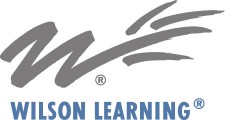Wilson Learning Sharpens Negotiation Skills in Today's Complex, Global Sales Environment

EDINA, Minn., July 26, 2017 (Newswire.com) - Wilson Learning Worldwide announced today that it revised and updated its Negotiating to Yes course to equip sales professionals with the skills they need to negotiate in today's complex, global environment.
At every turn in the sales process, salespeople are engaged in a negotiation with their customers. This occurs informally during discussions and formally during the proposal and contract stage. How the salesperson handles each informal or formal negotiation determines how the opportunity advances. Success lies in the ability to shift from a bargaining stance in which one party wins and the other loses to a principled negotiation approach in which the agreements benefit both parties. Through effective communication, customer relationships are strengthened.
The key takeaway is that a 'negotiation' focused only on bargaining over the final price or features of a contract is limiting and likely to result in an unsatisfactory outcome — for at least one or maybe both parties. Engaging in a principled negotiation process develops the confidence and skills for achieving a desired outcome for all parties involved.
Michael Leimbach, Ph.D., VP of Global Research & Development, Wilson Learning Worldwide
- The updated Negotiating to Yes program, built on negotiation principles that have helped thousands of people in hundreds of organizations worldwide, advances the application of negotiation skills for today's challenging sales environment. The core elements of successful negotiations have not changed:
- Avoiding the bargaining trap
- Developing a problem-solving mindset that separates the people from the problem
- Focusing on interests behind positions
- Having a strong alternative
- Seeking win-win outcomes
Dr. William Ury, world-renowned negotiation expert, best-selling author, and co-founder of Harvard's Program on Negotiation, has partnered with Wilson Learning for many years. He has focused on these bedrock negotiation strategies throughout his professional life. "I've often wondered why, despite the fact that we are engaged in negotiation, broadly speaking, most of our working day, we aren't better at it," he says. "My hunch is that this is because when we are negotiating, we have almost all of our attention focused on the outcome and not on the process itself for getting to that desired outcome." He adds, "If we can learn to place part of our attention on the process of how we handle these conversations, we can greatly improve the way in which we collaborate for mutual gain."
The new version of Negotiating to Yes takes this wisdom into account, focusing even more on the skills salespeople need to employ during the process of negotiating. The program challenges salespeople to practice and apply critical negotiation strategies in a contemporary risk-free environment as they hone their skills. Michael Leimbach, Ph.D., Vice President of Global Research and Development for Wilson Learning Worldwide, adds, "The key takeaway is that a 'negotiation' focused only on bargaining over the final price or features of a contract is limiting and likely to result in an unsatisfactory outcome — for at least one or maybe both parties. Engaging in a principled negotiation process develops the confidence and skills for achieving a desired outcome for all parties involved."
To learn more, contact Wilson Learning at www.WilsonLearning.com or 800.328.7937.
Wilson Learning — Improving Performance Through People
Wilson Learning Worldwide is a global leader in human performance improvement solutions for Global 2000, Fortune 500, and emerging organizations worldwide. With operations in more than 50 countries worldwide, incorporating over 30 languages, the company creates synergy between people and business strategy through an extensive range of world-class solutions focusing on leadership, sales, and workforce effectiveness. Its integrated offerings include strategy alignment consulting, descriptive and evaluative assessment services, world-class process and skills content, and technology-enabled solutions. More information about Wilson Learning is available online at www.WilsonLearning.com or by calling 800.328.7937.
About Dr. William Ury
Dr. William Ury is the co-founder of Harvard University's Program on Negotiation, a research center devoted to improving the theory and practice of negotiation and collaborative problem solving. He has spent the last 35 years working as a negotiation adviser and mediator in situations ranging from corporate mergers and acquisitions to wildcat strikes in a Kentucky coal mine, to helping stop wars in the Middle East, the Balkans, and Colombia.
Dr. Ury has also worked on improving relationships between companies and their key clients, facilitated tough negotiations between different departments, and helped train salespeople in working with their customers.
Media Contact:
Nancy Brenny
Wilson Learning
Tel: 952.828.8821
Email: Nancy_Brenny@WilsonLearning.com
Potential Headlines and Interview Questions for Further Insights
Overcoming the Top Negotiation Roadblocks
What are the top roadblocks that salespeople experience besides price? How did they handle the situations? What lessons did they learn?
What I Wish I'd Known About Sales Negotiations Before Sitting at the Table
What do people say were the most challenging aspects of being new to negotiation? What will they do differently next time?
You've Prepared but Not for This
What should salespeople do when something comes up in a negotiation that they weren't expecting or had not prepared for? What tactics should they use to keep calm and to think about their next move?
Source: Wilson Learning
